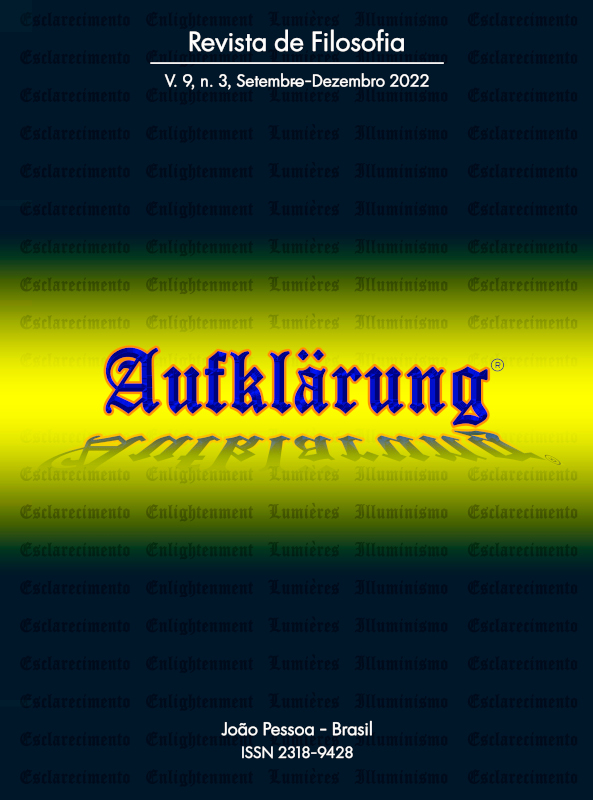Melancholy as a pivot of freudian topics: notes on the decentration of subjectivity
DOI:
https://doi.org/10.18012/arf.v9i3.62939Keywords:
unconscious, melancholia, first topic, second topicAbstract
The unconscious, the great Freudian discovery, was responsible for the entire composition of psychoanalytic theory. Like any theory, this concept underwent adaptations according to the discoveries of Freud, who saw the need to reestablish the rules and means of functioning of the psyche. Through drive antinomies, topologies related to the unconscious and, especially, melancholy as a pivot between topics, we will show how Freud makes it possible to think not only about the consequences of object loss, but how it influences the composition of the Ego. Electing it as fundamental to the establishment of the second topic, we will argue that it is from melancholy that Freud allows us to understand the Ego as decentered and dispossessed by an “other scene” that places it in a perpetually deficient situation. From the advent of the second topic, we will argue that Freud was able to reveal that the Ego is also unconscious
Downloads
References
ASSOUN, P-L. Freud, a Filosofia e os Filósofos. Rio de Janeiro: Francisco Alves Editora, 1978.
AYOUCH, T. Psicanálise de hibridez: gênero, colonialidade e subjetivações.Curitiba: Calligraphie, 2019
BAAS, B.; ZALOSZYC, A. Descartes e os fundamentos da psicanálise. Rio de Janeiro: Revinter, 1996
FREUD, S. (1900). A Interpretação dos Sonhos. Rio de Janeiro: Imago, 2001.
FREUD, S. (1914). Introdução ao Narcisismo. In: FREUD, S. Introdução ao Narcisismo, Ensaios de Metapsicologia e Outros Textos. São Paulo: Companhia das Letras, 2010a, vol. XII.
FREUD, S. (1915), O Inconsciente. In: FREUD, S. Introdução ao Narcisismo, Ensaios de Metapsicologia e Outros Textos. São Paulo: Companhia das Letras, 2010b, vol. XII
FREUD, S. (1917 [1915]), Luto e Melancolia. In: FREUD, S. Introdução ao Narcisismo, Ensaios de Metapsicologia e Outros Textos. São Paulo: Companhia das Letras, 2010c, vol. XII
FREUD, S. (1920). Além do Princípio do Prazer. In: FREUD, S. História de uma Neuróse Infantil (“O Homem dos Lobos”), Além do Princípio do Prazer e Outros Textos. São Paulo: Companhia das Letras, 2010d, vol. XIV.
FREUD, S. (1923). O Eu e o Id. In. FREUD, S. O Eu e o Id, “Autobiografia” e Outros Textos. Companhia das Letras, 2011, vol. XVI
GARCIA-ROZA, L. A. Freud e o inconsciente. Rio de Janeiro: J. Zahar, 2014a.
FREUD, S. Introdução à metapsicologia freudiana. Rio de Janeiro: J. Zahar, 2014b. v. III.
LACAN, J. (1955-1956). Do Não-senso, e da estrutura de Deus. In: LACAN, J. O Seminário, livro 03: As Psicoses. Rio de Janeiro: J. Zahar, 1988a.
LACAN, J. Escritos. Rio de Janeiro: J. Zahar, 1998
LACAN, J. (1964). O Seminário, livro 11: Os Quatro Conceitos Fundamentais da Psicanálise. Rio de Janeiro: J. Zahar, 1988b.
LAPLANCHE, J.; PONTALIS, J. B.Vocabulário da psicanálise. São Paulo: Martins Fontes, 2001.
MEZAN, R. Freud: a trama dos conceitos. São Paulo: Perspectiva, 2013.
NÁSIO, J-D. Cinco lições sobre a teoria de Jacques Lacan. Rio de Janeiro: J. Zahar, 1993
NÁSIO, J-D. Lições sobre os 7 conceitos cruciais da psicanálise. Rio de Janeiro: J. Zahar, 1997
NÁSIO, J-D. O Prazer de Ler Freud. Rio de Janeiro: J. Zahar, 1999.
ROUDINESCO, E. Por que a psicanálise?. Rio de Janeiro: J. Zahar, 1999
ROUDINESCO, E.; PLON, M.Dicionário de psicanálise.Rio de Janeiro: J. Zahar, 1998
SALIH, S. Judith Butler e a Teoria Queer. Belo Horizonte: Autêntica Editora, 2019.
Additional Files
Published
How to Cite
Issue
Section
License

This work is licensed under a Creative Commons Attribution 4.0 International License.
Journal general policy
1.This journal works under a Creative Commons License aplied to online journals. That icence can be read in the following link: Creative Commons Attribution 4.0 International (CC BY 4.0).
2.Accordingly to this License, a)the journal declares that authors hold the copyright of their articles without restrictions, and they can archieve them as post-print elsewhere. b)the journal allow the author(s) to retain publishing rights without restrictions.
Metadata Policy for information describing items in the repository
1. Anyone may access the metadata free of charge at anytime.
2.The metadata may be re-used in any medium without prior permission, even commercial purposes provided the OAI Identifier or a link to the original metadata record are given, under the terms of a CC BY license refered for the Journal.







































